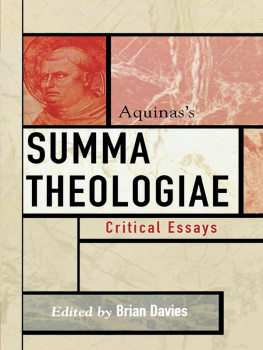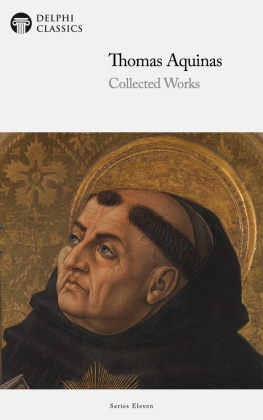
Vidimus et adprobavimus ad normam statutorum
Prof. Dr. Stephen Brock
Prof. Dr. Robert Wielockx
Imprimi potest
Prof. Dr. ngel Rodrguez Luo
Decano della Facolt di Teologia
Dr. Manuel Miedes
Segretario Generale
Roma, 25 January 2013
Prot. n 13/2013
Imprimatur
Con approvazione ecclesiastica
His Excellency Peter J. Jugis, JCD
Bishop of the Diocese of Charlotte, North Carolina
Charlotte, 22nd February 2013
TABLE OF CONTENTS
SECTION ONE
THE METAPHYSICAL SUBSTRUCTURE OF FRIENDSHIP
SECTION TWO
INCARNATE FRIENDSHIP AND DIVINE FRIENDSHIP
ABBREVIATIONS
The Summa theologiae is cited without title, beginning with the pars (e.g. I, II). Other words of Aquinas are cited with the following abbreviations in the order in which they appear in the thesis:
Ex Post. Analyt.: Expositio libri Posteriorum Analyticorum
Compend.: Compendium theologiae
Super Ioan.: Super Evangelium S. Ioannis lectura
De Ver.: Quaestiones disputatae de veritate
De Car.: Quaestiones disputatae de caritate
Sent.: Scriptum super Sententiis
Super Matt.: Super Evangelium S. Matthaei lectura
Meta.: Sententia libri Metaphysicae
ScG: Summa contra Gentiles
De Malo: Quaestiones disputatae de malo
De Pot.: Quaestiones disputatae de potentia
De princ.: nat. De principiis naturae
In Physic.: In libros Physicorum
De spirit. creat.: Quaestio disputata de spiritualibus creaturis
De virt.: Quaestiones disputatae de virtutibus
De sub. crea.: De substantiis separatis
De hebdom. Expositio libri Boetii De hebdomadibus
De div.: nom. In librum B. Dionysii De divinis nominibus
Sent.: Ethic. Sententia libri Ethicorum
Sent. Polit.: Sententia libri Politicorum
De Anima: Quaestio disputata de anima
Super Heb.: Super Epistolam ad Hebraeos
Super Rom.: Super Epistolam ad Romanos lectura
Super Is.: Expositio super Isaiam ad litteram
Super Eph.: Super Epistolam ad Ephesios lectura
Super Phil.: Super Epistolam ad Philipenses lectura
Super Gal.: Super Epistolam ad Galatas lectura
Super I Cor.: Super I Epistolam ad Corinthios lectura
Super II Cor.: Super II Epistolam ad Corinthios lectura
Catena in Mt.: Catena aurea in quatuor Evangelia
Catena in Lc.: Catena aurea in quatuor Evangelia
Abbreviations for the works of Aristotle
NE: Nichomachean Ethics
Metaph.: Metaphysics
I have taken the liberty of placing the majority of the texts of Thomas in the footnotes for the convenience of the reader.
INTRODUCTION
I. The Thesis
Moral theology is a part of sacra doctrina which scientifically studies the causes of mans eternal beatitude. Whereas ethics more precisely examines human action, moral theology has God as its formal object and universal cause and man as ordered to the attainment of God as end. Nevertheless, human action also falls under the province of moral theology for man is himself a caused cause, who, in virtue of his rational nature has dominion over himself making his acts his acts and thus ethically adjudicable. Among the various causes through which God brings man to the attainment of this end (e.g., law, grace, gifts etc.), the causes of the theological virtues are examined as actions that are genuinely mans but whose principal cause is God. St. Thomas Aquinas describes a virtue as the perfection of a power which disposes the agent toward right action. When an action is proportionate to mans capacity, such a virtue can be developed. When it is beyond mans nature, it must be given him. Charity is the theological virtue that perfects the will in its acts; thus it is a virtue which makes man himself good. For this reason, Thomas simply states that the perfection of the Christian life consists radically in charity.
But what is charity? Thomas defines charity simply as friendship. Given this assertion, many questions arise which are in need of answers. By what authority does Thomas identify charity as friendship with God? How can man be a friend of God given the infinite inequality between the friends? More fundamentally, what does it mean to be a friend? What is its definition and what are the perfected acts caused by the virtue of friendship? All of these questions and more will be discussed in this thesis, a thesis that has as its formal object an attempt to understand and explain Thomas simple statement: charity is a kind of friendship of man for God.
In order to properly examine Thomas assertion, other disciplines must come to the ready if true understanding is to be obtained. First, the moment one asks what something is , he has entered into the domain of metaphysics which studies being as being. Yet the relative abandonment of formal and final causality (metaphysical notions) in moral reasoning has led to the pejorative use of the term abstract. To say that something is abstract is now tantamount to saying that it is incomprehensible or without value. Ironically, used as a verb it refers to the very process by which man, properly as rational, grasps that which he knows in its being, free from its material concatenation. In moral reasoning, this abstraction is that which makes freedom possible, for it is the means by which we attain the ratio of a given thing and can thus understand it under its aspect of good. Hence, abstraction is that which properly allows for comprehension and value as objective goodness and as something subjectively chosen.
Nevertheless, moral theology is essentially a practical science, and one must make a return, as it were, to matter in acts. Charity demands such a return since it is essentially ecstatic, that is, it concerns itself with an act of the will toward another . The other, in this case, happens to be God and all acts ordered to that end for his sake. This end surpasses mans reason, and as such, despite the best metaphysical analysis, it remains insufficient to comprehend what is meant by friendship with God. It was fitting, therefore, that God himself reveal the essence of charity. This he has done most perfectly in his Son who, speaking to his disciples, called them out of his own charity friends and who, by his charity, made them so. To know what charity is in the writings of St. Thomas demands metaphysical precision, but as Aquinas knows, to understand charity in its intensity and relationality demands knowledge of the charity of Christ. As Thomas states, whatever occurred in the mystery of redemption and Christs Incarnation was a work of charity. Christ was born out of charity and for charity he died.
II. The Methodology
The thesis, as noted above, demands a metaphysical investigation as foundational to an analysis of revelation as given in the mystery of the Incarnation and Passion of the Son. As such, the thesis delineates the methodology, namely an analysis of the necessary metaphysical concepts which will be subsequently employed in Thomas exposition of these revealed mysteries in his commentary on Johns Gospel in which the pericope identifying charity and friendship is found (Jn. 15:13). What are those concepts?
Thomas did not write a treatise on friendship itself. In examining the relevant passages in which he defines friendship, one notes that certain notions are employed consistently and need to be defined. Similarly, since the thesis is about man s friendship for God, an adequate understanding of Thomas anthropology is in order. Finally, since charity is itself a virtue but also one of the names of love in rational creatures, love itself must be examined according to the mind of Thomas. These three steps, I contend, will grant the necessary substructure for analyzing charity as Divine-human friendship. The metaphysical fruit gathered in the above investigation will then be applied by looking at Thomas commentary on Johns Gospel, thus drawing together the often disparate disciplines of philosophy and theology. Friendship will be applied first in its more familiar notion, for Christ in his humanity has made himself a friend of man. This application will lead to friendships transformation through the humanity of Christ to its fulfillment in Divine friendship. Charity is the form of the virtues orchestrating them to their perfection and ultimate end. Similarly, Christ in his Incarnation draws to human friendship those he has chosen and through his humanity orchestrates the acts of his disciples toward the Passion and ultimately by means of his humanity leads them into Divine friendship.
Next page







